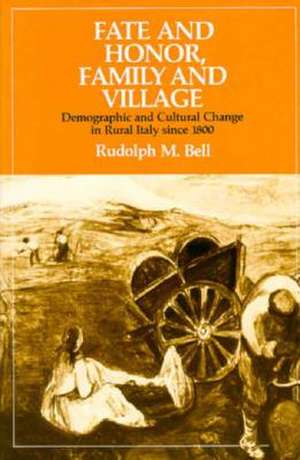Fate and Honor, Family and Village: Demographic and Cultural Change in Rural Italy Since 1800
Autor Rudolph M. Bellen Limba Engleză Hardback – 30 noi 1979
The Italian peasantry has often been described as tragic, backward, hopeless, downtrodden, static, and passive. In Fate and Honor, Family and Village, Rudolph Bell argues against the characterizationmore by reconstructing the complete demographic history of four country villages since 1800. He analyzes births, marriages, and deaths in terms of four concepts that capture mroe accurately and sympathetically the essence of the Italian peasant life: fortuna (fate), onore (honor, dignity), famiglia (family), and campanilismo (village).
Fortuna is the cultural wellspring of Italian peasant society, the world view from which all social life flows. The concept of fortuna does not refer to philosophical questions, predestination, or value judgments. Rather, fortuna is the sum total of all explanations of outcomes perceived to be beyond human control. Thus, in Bell's view, high mortality does not lead peasants to a resigned acceptance of their fate; instead, they rely on honor, reciprocal exchanges of favors, and marriage to forge new links in their familial and social networks. With thorough documentation in graphs and tables, the author evaluates peasant reactions to time, work, family, space, migration, and protest to portray rural Italians as active, flexible, and shrewd, participating fully in shaping their destinies.
Bell asserts that the real problem of the Mezzogiorno is not one of resistance to technology, of high birth rates, or even of illiteracy. It is one of solving technical questions in ways that foster dependency. The historical and sociological practice of treating peasant culture as backward, secondary, and circumscribed only encourages disruption and ultimately blocks the road to economic and political justice in a postmodern world.
Fortuna is the cultural wellspring of Italian peasant society, the world view from which all social life flows. The concept of fortuna does not refer to philosophical questions, predestination, or value judgments. Rather, fortuna is the sum total of all explanations of outcomes perceived to be beyond human control. Thus, in Bell's view, high mortality does not lead peasants to a resigned acceptance of their fate; instead, they rely on honor, reciprocal exchanges of favors, and marriage to forge new links in their familial and social networks. With thorough documentation in graphs and tables, the author evaluates peasant reactions to time, work, family, space, migration, and protest to portray rural Italians as active, flexible, and shrewd, participating fully in shaping their destinies.
Bell asserts that the real problem of the Mezzogiorno is not one of resistance to technology, of high birth rates, or even of illiteracy. It is one of solving technical questions in ways that foster dependency. The historical and sociological practice of treating peasant culture as backward, secondary, and circumscribed only encourages disruption and ultimately blocks the road to economic and political justice in a postmodern world.
Preț: 320.30 lei
Preț vechi: 402.21 lei
-20% Nou
Puncte Express: 480
Preț estimativ în valută:
61.29€ • 65.54$ • 51.10£
61.29€ • 65.54$ • 51.10£
Carte indisponibilă temporar
Doresc să fiu notificat când acest titlu va fi disponibil:
Se trimite...
Preluare comenzi: 021 569.72.76
Specificații
ISBN-13: 9780226042084
ISBN-10: 0226042081
Pagini: 286
Dimensiuni: 152 x 229 x 23 mm
Greutate: 0.48 kg
Editura: University of Chicago Press
Colecția University of Chicago Press
ISBN-10: 0226042081
Pagini: 286
Dimensiuni: 152 x 229 x 23 mm
Greutate: 0.48 kg
Editura: University of Chicago Press
Colecția University of Chicago Press
Notă biografică
Rudolph M. Bell is professor of history at Rutgers University. He is the author of Party and Fraction in American Politics.
Cuprins
List of Tables
List of Figures
Acknowledgments
1. Introduction
2. Setting
3. Past
4. Time
5. Family
6. Work
7. Space
8. Migration
9. Epilogue: Future
Note on Demographic Sources
Note on Participatory Interviews
Appendix A: "What Is a Peasant?"
Appendix B: Monthly Distribution of Deaths by Age Group
Appendix C: Age at First Marriage by Age Cohort by Decade
Appendix D: Classification of Occupations
Notes
Index
List of Figures
Acknowledgments
1. Introduction
2. Setting
3. Past
4. Time
5. Family
6. Work
7. Space
8. Migration
9. Epilogue: Future
Note on Demographic Sources
Note on Participatory Interviews
Appendix A: "What Is a Peasant?"
Appendix B: Monthly Distribution of Deaths by Age Group
Appendix C: Age at First Marriage by Age Cohort by Decade
Appendix D: Classification of Occupations
Notes
Index
